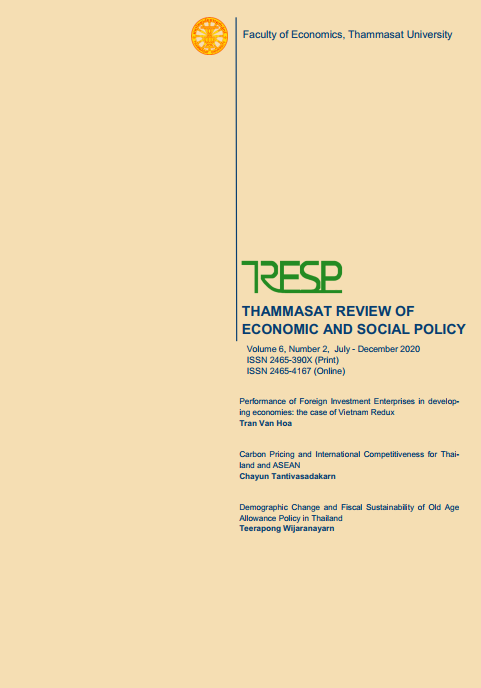Demographic Change and Fiscal Sustainability of Old Age Allowance Policy in Thailand
DOI:
https://doi.org/10.14456/tresp.v6i2.249129Keywords:
Aging society, Old age allowance policy, Fiscal sustainability, Demographic change, Fiscal policyAbstract
Thailand must face the challenges of an ageing society. The government should manage their expenditure and revenue collection in accordance with an increase in the number of elders in the society on account of old age allowance expenditures. Old age allowance aims to cover all elders except those in the pension system. This paper examines the impact of demographic change on fiscal sustainability of old age allowance policy, particularly by setting model, where a computational overlapping generations model is employed under a general equilibrium context. The simulation is divided into 3 parts: the first part is the impact of demographic change on the economy, the second part is the introduction of old age allowance and its impact on fiscal burden, and the third part is the fiscal impact of an increase in government expenditure. The study found that government expenditure will increase as there will be an increasing proportion of aged individuals. The increase in government expenditure causes an increase in public debt, which eventually causes the delay of repayment of public debt and a shift to the next generation. The increase of value-added tax rate generates more revenue collection for the government when compared to increasing personal income tax rate. The value-added tax has more distortionary effect on the economy than an increased personal income tax.
References
Manprasert, S. (2010). Demographic change and the impact on macro economy. In Worawet Suwanrada (Editor), series project "The economic dimension of demographic change" (pp. 248). Saksopakanpim: The Thailand Research Fund(TRF). (in Thai)
Davis, N. & Fabling, R. (2002). Population Ageing and the Efficiency of Fiscal Policy in New Zealand: New Zealand Treasury.
Pitsayabut, N. & Punpiamrat (2013). Ageing society and the impact on social economy. In Worawet Suwanrada (Editor), series project "The economic dimension of demographic change" (phase 2). Bangkok: The Thailand Research Fund(TRF). (in Thai)
Potipiti, T, & Kulkolkarn, K. (2010). Aging Society and Production Structure of Thailand, Demographic Change and Macro economy of Thailand. Bangkok: The Thai Resarch Fund (TRF). (in Thai)
Suwankesorn, S. (2013). Demographic change and the growth of courntries in ASEAN. Phitsanulok. (in Thai) from http://ms.psru.ac.th/admin/file/Influencing_Supsi@2013.pdf
Suwanrada, W. (2014). The government pension reform. Printery of Chulalongkorn University: Faculty of economics Chulalongkorn University. (in Thai)
Suwanrada, W. & Chandoevwit, W. (2010). Old-age Welfare and National Pension. Bangkok: Kewpie Co. Ltd. (in Thai)
Ihori, T., Kato, R., Kawade, M. & Bessho, S. (2005). Public Debt and Economic Growth in an Ageing Japan.Center for Risk Research: Faculty of Economics, Shiga University.
United Nations Population Fund. (2556). The Effects of Demographic Change in Thailand from http://www.nesdb.go.th/temp_social/data/data_02.pdf (in Thai).



